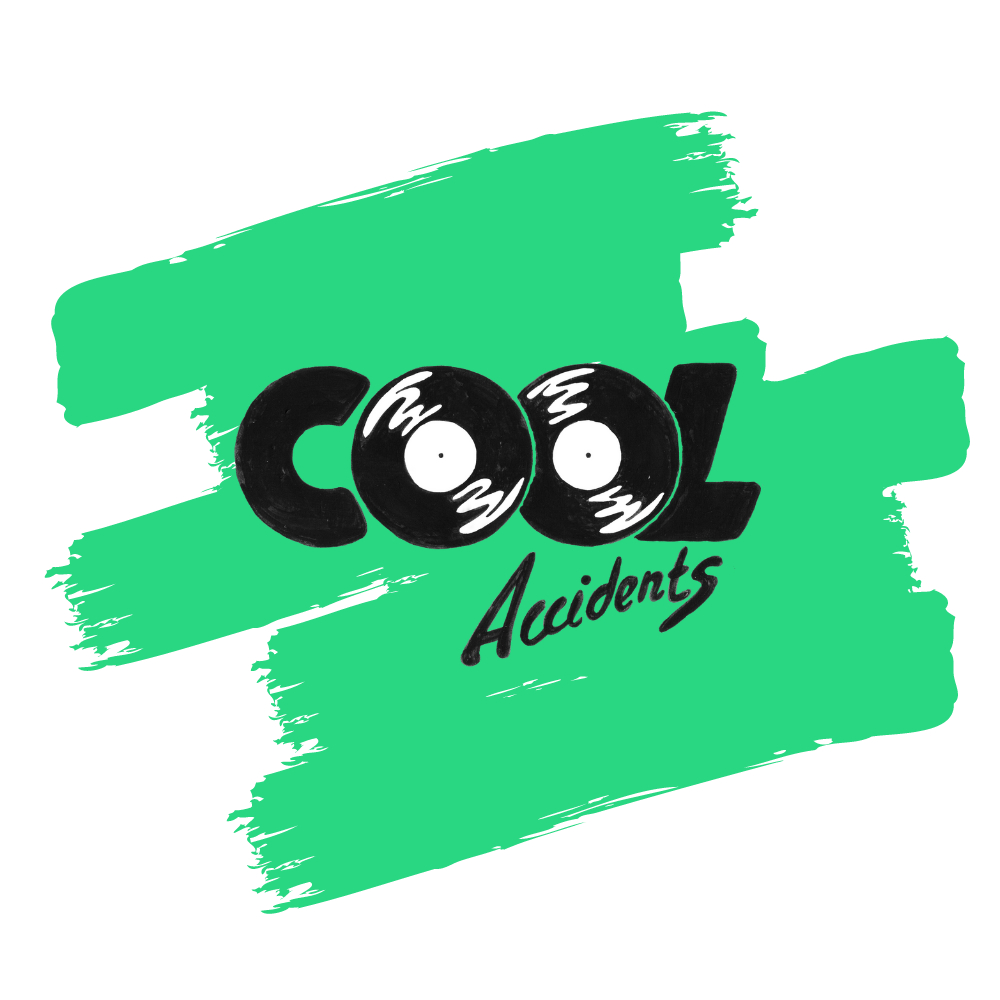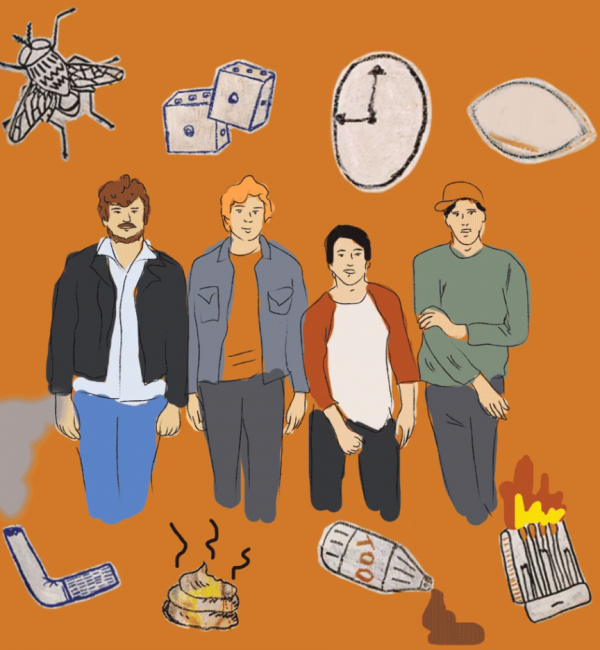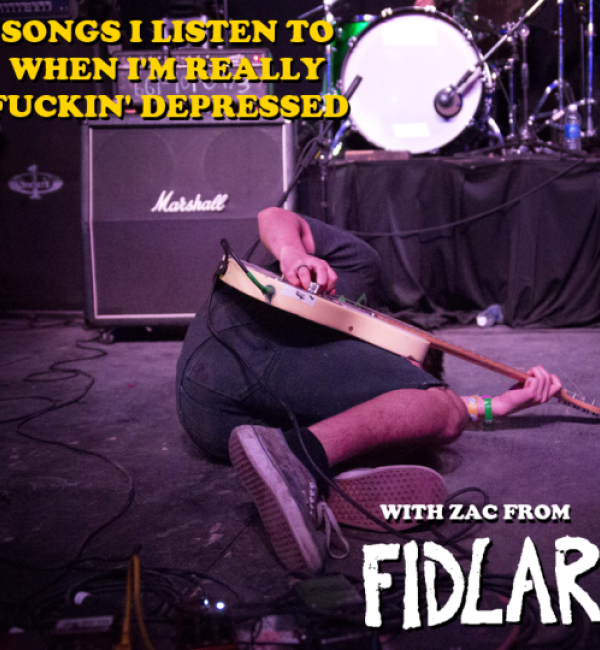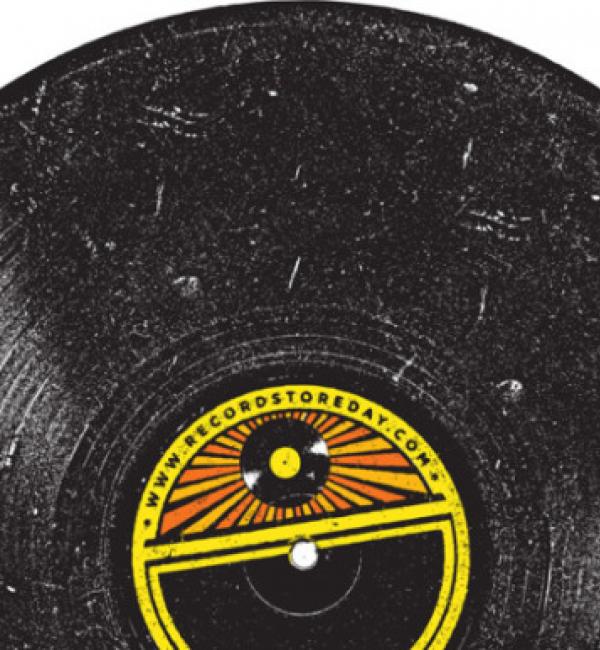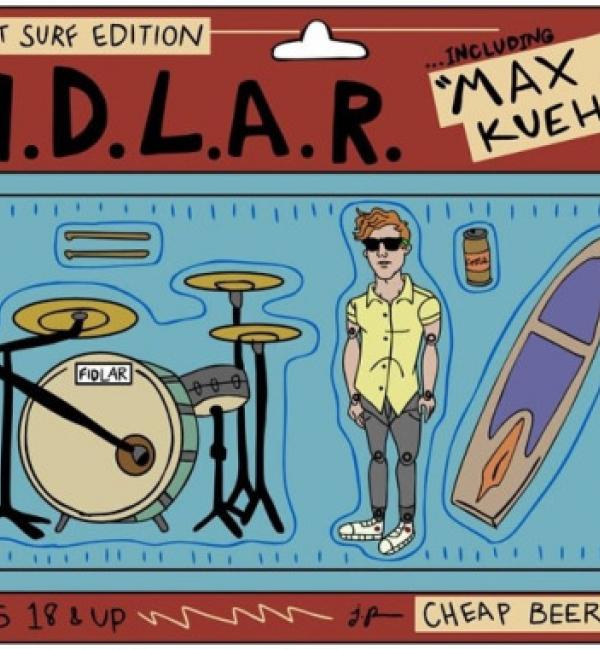Via LA Weekly’s West Coast Sound
Let other cities have their feel-good, celebratory theme songs — their “Philadelphia Freedom,” their “Empire State of Mind.” Here in Los Angeles, we like our urban anthems dark.
Sure, we’re the land of endless sunshine and Hollywood high rollers. But we’re also the birthplace of gangsta rap, the sleazy home of hair metal, the place where sex and drugs met rock & roll, the dream factory where dreams come to die. Yeah, we can be pretty, but we’re proud of our ugly side. Los Angeles isn’t for everyone, which is what it makes it so special to those of us who can’t imagine living anywhere else.
So you won’t find any sun, sun, sun or fun, fun, fun (well, except the kind to be had in strip clubs) on our list of the 20 greatest songs about our city. With all due respect to The Beach Boys, that isn’t what L.A. is about for us. It’s about the dark stuff.
20. Dr. Dre, “Let Me Ride”
In 1992, all eyes were on Los Angeles. On April 29, the four white LAPD officers who had been videotaped using excessive force against Rodney King were acquitted. The city responded by rioting; later that summer, Dr. Dre recorded his seminal solo debut, The Chronic. From the track’s tea-kettle squeal to Dre’s first-things-first announcement that he’s got his “Glock cocked,” “Let Me Ride” immediately transmits the danger of living in a city where those entrusted with protecting and serving pose as much of a threat as anyone. But for every dark underbelly there’s a sunny side, and Dre created a rolling, glistening G-Funk soundtrack perfect for L.A.’s favorite pastime, lowriding. Snoop Dogg’s gentle snarl on the hook made you want to hit Slauson when the sun went down, no matter the consequences. - Rebecca Haithcoat
19. Fidlar, “Cheap Beer”
Ripping into the song with some furious surf guitar and the sort of frayed aggression that drivers in this city are all too familiar with, Fidlar are on a mission – to get effed up. The track evokes the frantic, endless hurry everybody here always seems to be in, but also captures what it’s like to be young and reckless in L.A. – cheap beer, shitty cars, and lots and lots of weed. In a city famous for street cruising, Fidlar takes us on a drunken journey from Alvarado to the 101 freeway, down south towards Mexico, and back over to the Westside. If the line “Supposed to be in Santa Monica at 8 a.m.” makes you cringe, it’s a safe bet you’re an Angeleno. - Artemis Thomas-Hansard
18. Michelle Shocked, “Come a Long Way”
 It’s too bad Michelle Shocked is best-known these days for committing career suicide with a bizarre anti-gay rant at a 2013 show in San Francisco. Because in her late ‘80s/early ‘90s golden years, she was one of the warmest, wittiest singer-songwriters to cross over from the college folk circuit into the mainstream. “Come a Long Way,” from 1992’s Arkansas Traveler, is the Texas native’s rollicking ode to her adopted hometown, told in flashes of familiar landmarks seen from the back of a motorcycle: MacArthur Park, East L.A. (“Pescado mojado me encontré”), Watts Towers, Mulholland Drive. Any recent transplant who’s spent a weekend cruising our city’s endless sprawl can relate to the song’s breezy chorus: “I’ve gone 500 miles today … and never even left L.A.” - Andy Hermann
It’s too bad Michelle Shocked is best-known these days for committing career suicide with a bizarre anti-gay rant at a 2013 show in San Francisco. Because in her late ‘80s/early ‘90s golden years, she was one of the warmest, wittiest singer-songwriters to cross over from the college folk circuit into the mainstream. “Come a Long Way,” from 1992’s Arkansas Traveler, is the Texas native’s rollicking ode to her adopted hometown, told in flashes of familiar landmarks seen from the back of a motorcycle: MacArthur Park, East L.A. (“Pescado mojado me encontré”), Watts Towers, Mulholland Drive. Any recent transplant who’s spent a weekend cruising our city’s endless sprawl can relate to the song’s breezy chorus: “I’ve gone 500 miles today … and never even left L.A.” - Andy Hermann
17. The Tubes, “White Punks on Dope”
Bizarro ‘70s art-punk had a million early adopters, but none of them could out-weird or out-theatric The Tubes. With their circusy hijinks and cast of dozens, cleverly ripping apart the day-glo showbiz of the late ‘70s and early ‘80s, they always pushed the envelope. So when the San Francisco-based group took on the suburbs-to-L.A. exodus in “White Punks on Dope” on their 1975 debut record, they did it with characteristic outrageousness. It’s a classic story of rich ennui, told through sun-bleached Hollywood lens flare. All these strung out suburban punks have the problems other poor jerks only dream of having — too much time and too many goddamned drugs. This track is a rare example of outsiders perfectly capturing the zeitgeist of L.A. youth. - Paul T. Bradley
16. DJ Quik, “Born and Raised in Compton”
The first single from DJ Quik’s 1991 debut, Quik is the Name, “Born and Raised in Compton” was a more melodic and personal introduction to the city for rap listeners than the barrage of militant nihilism that was N.W.A.’s “Straight Outta Compton.” However, Quik didn’t excise the gritty details for the sake of accessibility. Instead, he honestly depicted his conflicted relationship with his birthplace. His Compton was still the home to jackers and crack. A bulletproof vest still wasn’t a bad idea. Your turntables and SP-1200 could still be stolen from your home. Yet Quik, like most native Angelenos, displayed an undying affection for his hometown. He may have written part of the song to avenge the injuries he suffered while living in the city, but the “CPT sign” remained written on his chest. - Max Bell
15. Hole, “Malibu”
If there was ever a better line written to describe why this place is what it is – a mecca for artists and misfits to find, or lose, themselves – than “Oceans of angels / Oceans of stars / Down by the sea is where you / Drown your scars,” well, we dare you to find it. Led by a very lethargic guitar, “Malibu” tells the story of a wanderer, too numb to navigate, fighting to survive in the pseudo-glamorous, jaded realm that is Los Angeles. The song swells with the burnt-out desperation that defines this star-struck city; it reveals our disease, but also offers a cure in the sand, sunset and crashing waves. - Artemis Thomas-Hansard
14. Jurassic 5, “Lausd”
Jurassic 5’s Quality Control was the hip-hop collective’s major-label debut and brought the first national attention to the slew of talent coming out of South Central’s Good Life Café open mic nights. Released in 2000, the record featured 15 tracks of freestyle-inspired knowledge, peppered with an occasional drop of L.A. pride. On “Lausd,” the city becomes the subject, as each J5 member takes turns spitting reality checks to anyone who hasn’t made it past the SoCal clichés of enviable weather and Hollywood glamour. Through a succession of rapid-fire verses, Chali 2na, Akil, Zaakir and Marc 7 give a primer on the “the land of earthquakes and high crime rates,” where hopes are blown, drama collects, and you better not need a babysitter if you’re ever going to make it out alive with your big dreams intact. - Sarah Bennett
13. Soul Coughing, “Screenwriter’s Blues”
“You are going to Reseda to make love to a model from Ohio / Whose real name you don’t know.” Somehow, without ever having set foot in Los Angeles (a brief trip to Orange County notwithstanding), a young singer-songwriter from New York named Mike Doughty nailed the hazy, rootless feeling that falls over you in this city when it’s 5 a.m. and you’re hurtling down an empty freeway towards that last, lonely, desperate booty call, with the sun’s first rays “painting the smoke over our heads an imperial violet” and only a blathering morning radio jock to keep you company. L.A. is both a city built on fantasies, and a city where fantasies dissolve in the cold light of day — and Soul Coughing’s funny, phantasmagoric portrait captures both aspects in near-perfect symmetry. - Andy Hermann
12. The Decemberists, “Los Angeles, I’m Yours”
For those who hate but love L.A., The Decemberists’ reluctant 2003 ode puts all those complicated, mixed feelings to song. In “Los Angeles, I’m Yours,” the Portland-based band turns our city’s most unlovable elements — from prostitutes to pollution — into poetic verses that seem at first to promote immediate evacuation. Who wants to live in a “ditch of iniquity and tears”? But just as singer Colin Meloy and his acoustic guitar have you abhorring L.A. as much as he does (or at the very least never wanting to hit the beach — “an ocean’s garbled vomit on the shore” — again), he resigns himself to affection for it, singing the eponymous one-line chorus as only an outsider can — with enough thoughtful contradiction to make all the ugliness beautiful. - Sarah Bennett
11. Mötley CrÜe, “Girls, Girls, Girls”
“Girls, Girls, Girls” is primarily a not-so-subtle ode to strippers. But at the heart of the metal song is a heartfelt love letter to Los Angeles, the neon paradise where all the girls raise hell. Mötley CrÜe’s most instantly recognizable anthem serves as a lyrical directory of strip clubs from Atlanta to Vancouver to Paris, but its sound is pure late-night Los Angeles. A four-and-a-half-minute medley of wailing electric guitars, head-banging rhythms, and testosterone-amped hooting and hollering, “Girls, Girls, Girls” has come to define the Sunset Strip and its infamous 1980s party scene. Vince Neil immortalized the now-defunct Tropicana (“where I lost my heart”), and cemented Body Shop and Seventh Veil (reportedly Neil’s favorite hangout, and the setting for the tawdry music video) as Hollywood landmarks. - Jennifer Swann
10. Warren Zevon, “Desperados Under the Eaves”
Of all the soused poets to wash up in Los Angeles, the late Warren Zevon too frequently gets the middle-of-the-pack treatment, often (shamefully) mentioned as an afterthought to flashier personalities. But “Desperados” is proof that he knew this town and its lonely strivers. Cooped up in his shitty motel room with The Shakes, a drink-desperate Zevon wittily narrates his frustration with L.A.’s refusal to give anyone a free pass. Even if it sinks into the ocean (oh, and it will), the city will still get its due. You may hate it here, but you can’t escape (“Heaven help the one who leaves”) so long as you’re empty-handed. Leave it to such a master songwriter, in all of his idle bitterness, to transform the maddening hum of an air-conditioner into an almost endless chorus. - Paul T. Bradley
9. Guns N’ Roses, “Welcome to the Jungle”
Unless you arrived when walking down Yucca could still get you knifed, it’s easy to think of Hollywood as a safe playground for wannabe stars. If you want a taste of that former life, however, you need look no further than the opening track of Appetite for Destruction. Guns N’ Roses were an ugly band for ugly people in an ugly part of an otherwise beautiful city. Think of this track as the sound of a young man’s first mugging. Visualize it playing in the background the first time a starlet fucks for the rent. Imagine it soundtracking a new addict’s first experience with dope sickness. That’s the Los Angeles GnFnR documented — the city that a young Bill Bailey arrived at on the Greyhound. - Nicholas Pell
8. NWA, “Straight Outta Compton”
In the summer of 1988, the U.S. needed a wake-up call. L.A. was not Hollywood. Hollywood was not L.A. Twenty miles south of the sound stages and the Walk of Fame, disenfranchised denizens warred over primary colors and government-owned blocks. Death came by bullets, narcotics, and at the hands of brutal, lawless and often racist police officers. N.W.A. was that wake up call. “Straight Outta Compton” was their war cry for their home turf, but it spoke for all marginalized cities and citizens in greater Los Angeles. Over Dr. Dre and DJ Yella’s banging, funk-filled production, Ice Cube, MC Ren and Eazy-E exposed the world to their nightmarish reality and the militant minds it created. Both L.A. and rap would never be looked the same way again. - Max Bell
7. The Kinks, “Celluloid Heroes”
Appearing on the British rockers’ aptly titled 1972 record, Everybody’s In Show-Biz, “Celluloid Heroes” spoke skeptically about movie stars through the use of nostalgic images, specifically Hollywood Boulevard’s Walk of Fame, a constant reference throughout. Ray Davies name-checks actors Greta Garbo, Mickey Rooney and Marilyn Monroe amongst the fallen heroes who live on via the silver screen. The tune is a cautionary tale for young hopefuls who seek fame. Davies’ ode to the dead stars reflects ultimately — and bittersweetly — the narrator’s deluded wish that his life was like a movie, since “celluloid heroes never feel any pain.” An outsider’s sentimental warning about the pitfalls of our city’s most fabled industry, “Celluloid Heroes” hits home a bit closer than many of us would care to admit. - Daniel Kohn
6. A Tribe Called Quest, “I Left My Wallet in El Segundo”
Based on an almost mythical shithole-of-all-shitholes frequently referenced by Sanford and Son patriarch (and nearby Watts resident) Fred Sanford, the El Segundo of this Tribe Called Quest master track exemplifies Southern California weirdness as perceived by New Yorkers on a cross-country joyride. Somewhere between suburban blandness and an endless array of oil company trash dumped onto a marsh, Q-Tip and crew weren’t far off the mark when they wrote of a place where you’d be pissed to leave your wallet — even if there was that one sexy waitress. While it doesn’t accurately describe the current, somewhat cleaned-up El Segundo, the song has become a familiar cultural reference point for L.A.’s many sprawling, forgettable burbclaves. - Paul T. Bradley
5. Red Hot Chili Peppers, “Under the Bridge”
Red Hot Chili Peppers’ “Under the Bridge” is simultaneously one of the most depressing and uplifting songs ever written about Los Angeles. Detailing Anthony Kiedis’ darkest days shooting speedballs underneath a Mexican Mafia-controlled bridge in downtown L.A., the ballad begins with John Frusciante’s unmistakably melancholy guitar riff accompanied only by Kiedis’ confessional: “Sometimes I feel like my only friend / Is the city I live in / The city of Angels.” It’s both incredibly heartbreaking and comforting to know that even when you’ve got no one else, the city is always there for you, a constant concrete companion that sees your good deeds and knows who you are. Ever since “Under the Bridge” catapulted the Chili Peppers to mainstream success in 1991, fans have sought to locate the bridge in question – but it’s “unimportant,” Kiedis told Rolling Stone in 1992. Still, during our loneliest days, we’ll always imagine that bridge downtown, wherever it might be. - Jennifer Swann
4. Ice Cube, “It Was a Good Day”
Ice Cube always had a knack for storytelling laced with razor-sharp social commentary—even on “It Was a Good Day,” in which Ice Cube just recounts a typical day in his life. In addition to the L.A. specificity (smog, Fatburger, the Lakers), the genius of this song lies in the fact that although nothing goes wrong, everything could. No car jackers in sight, no helicopters patrolling the hood. And again, there’s that dichotomy that’s so quintessentially L.A. — despite the ever-present threat of violence, the song just sounds so damn chill. Sure, it might’ve been a good day, but what constitutes a “good day” in South Central? He didn’t have to use his A-K. - Rebecca Haithcoat
3. Tupac, “To Live and Die in L.A.”
Often, those who love Los Angeles the most fervently are the transplants. No one repped the city harder than its most beloved adopted son, Tupac. “To Live and Die in L.A.” is both a love letter and a warning to the uninitiated. After all, if anyone understood how the brightest day will give way to the darkest night, it was Tupac. Though QD3’s production is as easygoing as a Sunday afternoon barbeque, Tupac’s lines flip back and forth between basking in the glitz of the Sunset Strip and fretting over his court cases, between shouting out his buddies Snoop and Suge and warning outsiders to tread carefully (“Thinking Cali just fun and bitches/Better learn about the dress code, B’s and C’s”). It’s a complicated song that looks so simple on the surface. Just like L.A. - Rebecca Haithcoat
2. X, “Los Angeles”
If any single track evokes the contradictions and complexities that come with living in this restless, sometimes raging city of ours, it’s X’s anthem “Los Angeles.” The title track from the band’s searing, Ray Manzarek-produced debut remains the L.A. band’s signature hit. Never mind that the opening verse clearly proclaims “She had to leave Los Angeles,” or that “she” had racist tendencies — the discriminatory lyrics were written for ironic shock value, and meant as a reflection of the time (1980) the track was written, according to co-writers/singers John Doe and Exene Cervenka. Fans for the most part always got that, choosing to ignore the track’s thematic darkness and discord, and instead succumbing to its equally raw rhythmic spell. Like the city itself, “Los Angeles” has a relentless allure that never fades. It’s not altogether pretty, but it is unforgettable. - Lina Lecaro
1.The Doors, “L.A. Woman”
You wake up on a chigger-infested couch after a late night of partying. The inside of your mouth tastes of stale cigarette smoke and hangover. You walk out to your ’69 Nova, pump the gas pedal twice, cross your fingers and pray to a god you don’t believe in that it starts. The engine fires up and you reach into your center console for your last smoke. Lighting it, you pull on a pair of shades even though the sky is still twilight blue and there are still stars twinkling overhead. Your temples throb as you drive around looking for donuts and coffee, hoping you can get some sleep before work.
And just as the sun cracks the top of its head over the Hollywood Hills, you hear “L.A. Woman.”
Congratulations. You’re part of the great chain of lowlife existence that arguably began with Mr. Mojo Risin’. Without this document of what it means to be young and degenerate in Los Angeles, we get no “Welcome to the Jungle,” no “Los Angeles” and certainly no “White Punks on Dope.” It all began here, and it sounds just as good now on the classic rock station as it did on the Mighty Met more than 40 years ago. - Nicholas Pell
